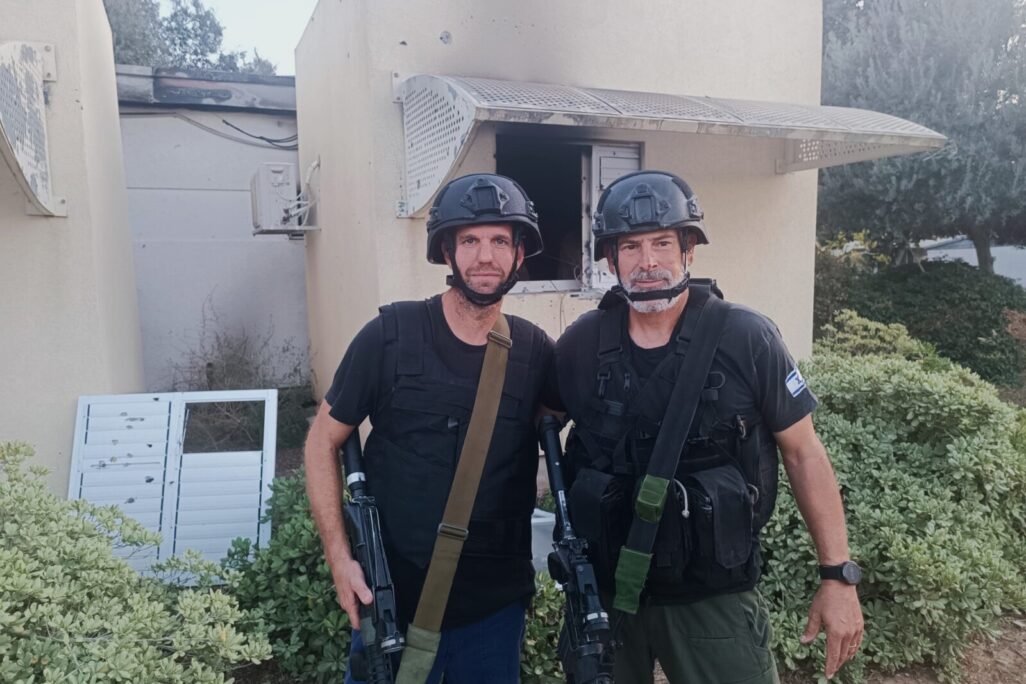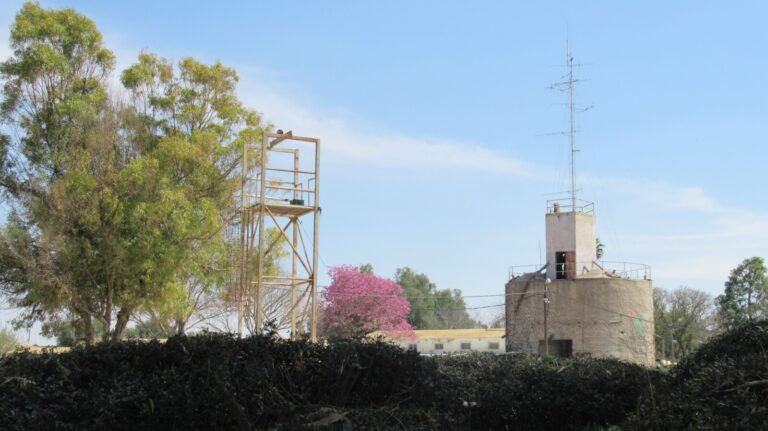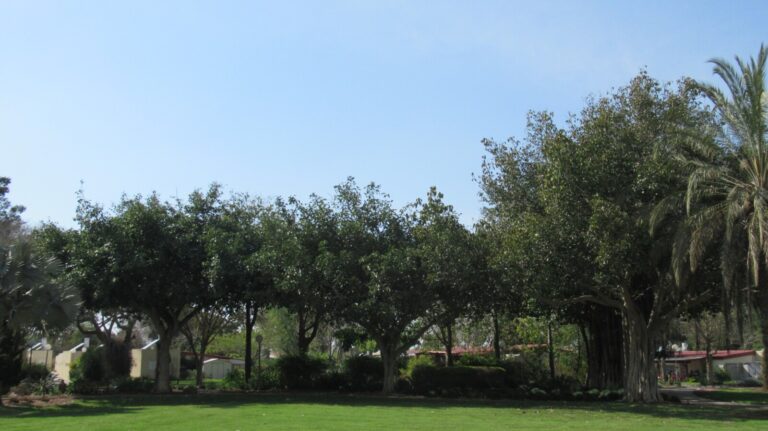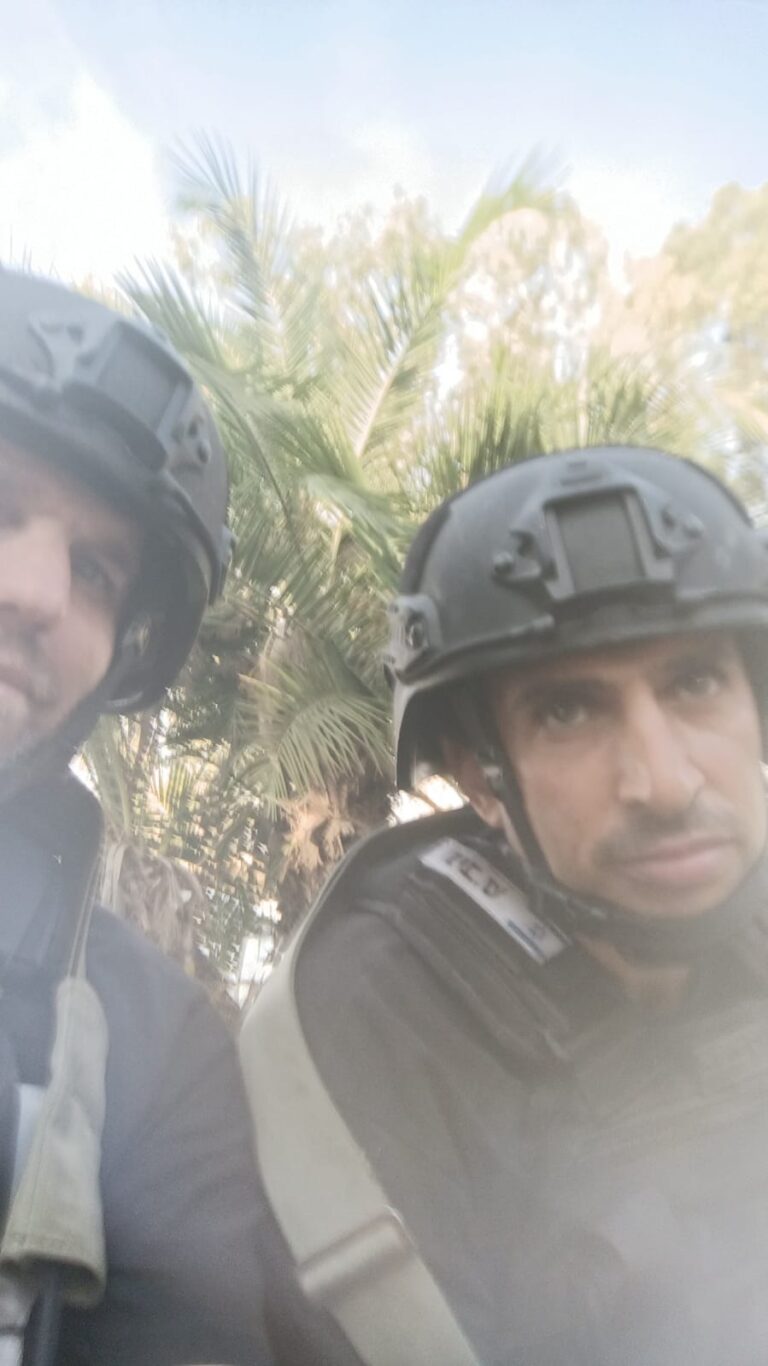
For Imri Bunim, 41, the events of Oct. 7 began at about 6:30 a.m., when a rocket siren went off in Kibbutz Re’im, where he and his family live.
As one of the closest kibbutzim to Gaza, Bunim and his family were no strangers to alarms warning of incoming rocketfire.
“We run to the shelter, which is also used as the children’s bedroom, calm them down and ask where we will evacuate to this time. To my wife's family in Zichron Ya’akov? Maybe we will go to Eilat?” he told Davar.
Before long, though, it became clear that the situation was not the sort of regular incident to which Re’im residents had become accustomed.
“There were many explosions,” Bunim said. “After a few minutes, you hear small arms fire. Very close. This is something we are not used to. I immediately took out my weapon. I looked for my combat gear. I got on my cargo pants, sports shoes, and went outside. Harel Oren, the local security coordinator, gathered us, the six members of the rapid response team who were staying at the kibbutz for the holiday of Simchat Torah, in the western area of the kibbutz fence. On the side facing Gaza.”
When the rapid response group members looked out toward Gaza, what they saw was “delusional.” Bunim described hearing gunshots and seeing many Gazan cars and motorcycles on the roads in the area, including on the road between Re’im and Urim, another nearby kibbutz.
“We asked ourselves: What is going on here? Are we alone in front of all the Gazans? You hear gunshots from the kibbutzim: Kissufim, Be’eri, Ein HaShlosha—kibbutzim that sit between us and the Gaza Strip, he said. “We realized that soon they would come to us as well. We were only six armed members. We were divided into three pairs. I was under the command of Niv Tovia—the lieutenant of the local security coordinator and the commander of the southern side.”
Bunim and Tovia are more than just partners on the rapid response team. “Niv is an old friend of mine, from the regular service in the 50th Battalion of the Nahal,” Bunim explained. “He is the one who brought me to Re’im. We have been best friends for 20 years—the most organic force there is, and now we are going against something unclear in order to preserve our lives, our values, the community, the place where we raised our children. When I’m with Tovia, I feel that everything will be fine.”
“We went towards the southern side of the kibbutz, on the last line of houses,” he said. “The fighting started at about half past seven. The goal was to delay the terrorists as much as possible until reinforcements arrived, in accordance with the drills we performed. The terrorists approached and we emerged each time from a different space between the houses, firing a few bullets, and moving. We tried to create the illusion that we were a great force. We tried to captivate them so that they stay as far away from the houses as possible. They were near the petting zoo and we were between the buildings of the children's houses. Our children are there routinely, so we know every bush and every tree. This is our home.”
“The terrorists moved west, and we followed them,” Bunim continued. “We couldn’t make contact because we knew we were the last line between them and the residents of the kibbutz. We knew that if we fell, they would enter the houses. All this time we were communicating with each other on walkie-talkies and WhatsApp. We realized that the terrorists came in three groups from three different directions to the kibbutz. We saw them enter the children’s house and understood that they were looking for hostages. The group in the southwest of the kibbutz, between 15 and 25 terrorists started setting fire to houses. We ran between the neighborhoods trying not to be exposed and tried to shoot at them from different points. To disturb them.”
At that point, amid many houses and trees that had gone up in flames, the members of the rapid response team began to receive messages from the kibbutz members.
“We received messages from members from all corners of the kibbutz about shots being heard, about shouting in Arabic. They ask where the reinforcements are. What is happening with the reinforcements? We realized that this is not an infiltration of individual terrorists. In practice, we learned to deal with a few terrorists, but here we are talking about groups, dozens of terrorists divided into different squads. In the most unimaginable scenario, there could not be a situation of dozens of well-armed, mounted terrorists, and we have no reinforcements. This is not something that we have a way to deal with alone. Where is the IDF? Where is the Air Force? We are alone in front of all of Gaza and there is not a single plane in the sky,” he recounted.

“What strengthened us was that all six members of the rapid response team continued to report,” Bunim said. “We did not feel that we were threatened from the rear. There is someone watching our back. Our familiarity with the terrain, and the fact that we had walkie-talkies, and we were practiced helped us to hold out. We knew where you put one barrel, and they will inevitably pass there. After about an hour of fighting, we began to hear the sounds of other weapons. We realized that it was a police force trying to engage the terrorists from outside. We jumped in another direction and continued to shoot them as well.”
Around 10:00 a.m., the rapid response team was joined by Oran Ahrak, a member of the team who had left early that morning for work and had returned to fulfill his duties.
“On the way to the kibbutz, he encountered terrorists and barely made it. He joined four police officers who jumped out of their homes to help. Four real heroes,” Bunim said.
“The positioning of the police on the axis allowed us to move to the southern gate of the kibbutz and open it to let in Oran with the police. We felt that there was a stabilization. The force went from six fighters to 11—and that’s in addition to the police force that was fighting the terrorists outside the fence. Our line of defense was doubled. There was a significant boost,” he said.
Ahrak’s arrival provided more manpower, but it also held a greater significance for Bunim.
“Oran is also my friend and partner for many years,” he said. “Together we run the soccer classes for the kibbutz children. As soon as I saw him running on the soccer field it changed everything for me. If until then I thought that today I was going to die and there would be nothing left of the kibbutz, it was at that moment I realized that we would win. We will win because we are together, and we are fighting for our home. The kibbutz will not die.”
“When you run with your friend, you have the feeling that you are fighting for our home. For everything that our home symbolizes to us—because the kibbutz is home. We are fighting for the place where our children are raised. We are fighting for the petting zoo, for the soccer field, for education, for culture. This is a war for our home, in the broadest sense but also in the smallest things,” he continued.

The enlarged force was now faced with the decision of whether to split up or stay together.
“We decided that Tovia and Oran would stay to guard the neighborhood. I ran with the police who did not know the kibbutz to show them where the houses on fire were,” Bunim said. “We crept up behind in a controlled manner, and when we got closer to where the arson squads were we saw that they were no longer there. Apparently the police who confronted them did the job. Kibbutz members came out of one of the burning houses. They came out of the window of the safe rooms and shouted that they were burning there. We realized that we had to go house by house and take everyone out of the burning houses, guard them and transfer them to the shelters in the houses that weren’t on fire. We went through the burning houses, we got to the last house, and when we opened the shelter, a family came out of it with their last strength. Two of them are in wheelchairs. It was a complicated procedure, there were difficult sights. A family that miraculously survived. They shut themselves in the safe room all this time quietly, and they were on fire.”
As kibbutz members began spraying the roofs with water from their hoses to extinguish the fires, Bunim returned to the kibbutz’s southern neighborhood to join back up with Niv and Oran.
“From there we skipped to a new neighborhood located in the center of the kibbutz,” he said. “While running, we passed the body of a terrorist we had taken down. We moved forward slowly in skips, securing each other, like you learn in the army. In the meantime, we were joined by two more friends from the rapid response team, Omri Ben Yishai and Ron (Bubu) Assaf. We went together to check what was going on with the Thai workers. We saw that everything was open and the Thai workers were gone. The Thai workers’ quarters were empty. We advanced through an olive grove. We suspected that we saw movement there and in a moment they were already shooting at us from there. We began to give orders to each other to thwart the terrorists, and then I heard a shout from the house of a friend who serves regularly. He shouts my name and calls me. Says he has a gunshot wound inside the shelter.”

After neutralizing the threat by the olive grove, the group went to the shelter of the friend who had called. Upon opening the door to his shelter, they saw about 15 young people who had fled to the kibbutz after being caught up in gunfire at the Nova rave not far from Re’im.
“They hid in the safe room quietly all this time, without air,” Bunim said. “In the crowd, they didn't speak. We got them out and took them to a clinic located about forty meters to the south. It was locked, so we broke the window and broke in. The sight of the children who came from this party was horrible. They vomited and we freaked out. It wasn’t pleasant.”
"We continued to fight the terrorists who were hiding in the area of the young people’s neighborhood and the olive grove, and one of the policemen was shot in the leg. He lost blood. I explained to him where he should evacuate and I went up to the head of the team to request evacuation. Meanwhile, the team leader said that regular army forces were going to arrive. From there I was called to the southern gate to bring additional forces into the kibbutz,” he continued.
“After additional forces entered, we ran to pick up another member of the emergency squad: Eyal Ahrak. We saw a window of a safe room open, and a kibbutz member who does not live in this house was sticking his head out. It turns out that he went there to look after three children who saw their father and his partner murdered in front of their eyes. The terrorists murdered the couple and wrote with the woman's lipstick on the wall that they do not kill children. He opens the window, and tells us these terrible things. We look at the grass in front of their house, where every day I would see the boy playing with his father, and the grass is full of soccer balls. They just took away the father from three children who loved him so much. In another house we heard that an 85-year-old woman was murdered in her bed,” he recounted.
The whole time the terror was unfolding, Bunim’s wife and children were in their shelter, holding the door shut.
“All the members of the kibbutz did this—they held the door of the safe room with all their strength and fought the terrorists who tried to open it,” Bunim said. “My wife called me to come home. She said she had to go to the bathroom, and I also had no ammunition left. So I ran with Eyal and Oran to my house. I entered the safe room. We guarded the house while my wife went to the bathroom, and in the process she handed me two cartridges that I had at home and filled them for me.”
“From there we continued to fight,” Bunim said. “Additional security forces joined us. Our role has changed, we connect forces and coordinate them. We look for those who need help. The situation is quite strange because the kibbutz is burned, and people are still in the shelters. And there are terrorists but there are no terrorists and actually it’s not clear. After midnight I went home. I lay on the couch and turned on the sports channel. I saw that the Glasgow Celtic fans were cheering for the Palestinians. It shocked me to the core to see that they were happy that their ‘freedom fighters’ burned down my kibbutz, murdered everyone they saw—babies and old people.”
“I fell asleep with my uniform and equipment with me. At half past one in the morning I woke up to a message from Tovia, a member of the rapid response team: ‘We have terrorists in the house, come quickly.’ I ran behind my house, where I met Harel. From there we were joined by forces from a paratrooper patrol. I did not believe at all that I would have to run to Tovia's house, where my children play all the time, with a gun and a bullet in the barrel. I lay down on the sidewalk behind his house, so that if terrorists came out from behind I would eliminate them. A force of paratroopers closed in on the house, threw a grenade inside, entered and killed the two terrorists. Tovia and his family were saved. And I just started crying and didn’t stop. I lay on the sidewalk behind Tovia's house, where I go every day to pick up my children in the afternoon. I just laid there and cried,” he said.
“I would like to praise the members of Kibbutz Re’im’s rapid response team: Harel Oren, Niv Tovia, Noam Gabbai, Omri Ben Yishai, Yaniv Ariel, Oran Ahrak, Eyal Ahrak, Avi Avital, and Ron (Bubu) Assaf. These people saved many lives. I want to send my condolences to all the members of Eshkol, Ofakim, Sderot—all residents of the Western Negev. And to the dear community of Re’im, who are currently not in the kibbutz, when they return we will rebuild everything here and show the whole world what a great community we are. And for those who are not clear, we will win,” Bunim concluded.






